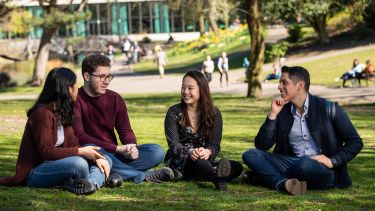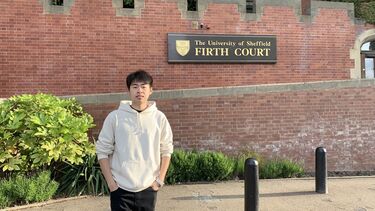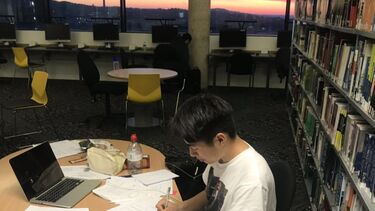How studying Environmental and Energy Engineering at Sheffield set me on the path to becoming a postdoc researcher

Before starting my MSc in Environmental and Energy Engineering at the University of Sheffield in 2020, I spent my final undergraduate year here as an exchange student from East China University of Science and Technology, studying Chemistry. Thanks to the 3+1+X Study Abroad Programme, I had the chance to study in Sheffield and complete my undergraduate research project. This experience really strengthened my interest in chemical engineering and helped me settle into the UK education system and way of life.
I really enjoyed my time as an exchange student, and that positive experience inspired me to continue my academic journey at Sheffield. The supportive learning environment, excellent teaching, and exposure to innovative research made it an easy decision to return for my master’s degree.
I chose to study the MSc in Environmental and Energy Engineering because it directly relates to the global challenge of climate change. The course covers key topics such as low-carbon technologies and sustainable energy systems, which perfectly align with my interests and career goals. The University of Sheffield also has a great reputation in this area, which gave me even more confidence in my decision.
Sheffield itself is also a brilliant place to live. It’s affordable compared to other big UK cities, and has a friendly, welcoming atmosphere. There are loads of Chinese food options, and the locals are really approachable. Plus, the city’s right on the doorstep of the beautiful Peak District, so it’s easy to get out into nature and enjoy the outdoors
During my master’s, I completed a research project focused on using CO₂ capture technology to reduce emissions from power plants. I wanted to get a better understanding of solvent-based post-combustion CO₂ capture and develop a process model to evaluate its technical performance.
Using Aspen Plus, I created and validated a model that could be scaled up to simulate a large CO₂ capture plant. That helped me explore ways to reduce energy use and lower capital costs. Through the project, I learned how to use simulation tools to solve real-world engineering problems and developed key skills in modelling, data analysis and critical thinking – all of which are crucial for working in process systems engineering.
One of the things I appreciated most about the MSc was the mix of group work and independent study. The group projects helped me improve my teamwork, communication and problem-solving skills, while the individual assignments encouraged me to dig deeper into subjects and think more critically.
I have just completed my PhD at the University of Sheffield in [Solar energy-driven liquid-based direct air capture with CO2 utilisation to produce sustainable aviation fuel]. My master’s gave me a solid grounding in chemical engineering and CO₂ capture technologies, which meant I could get stuck into my PhD project on Direct Air Capture (DAC) and CO₂ Utilisation right away. The experience I had using Aspen Plus and approaching technical challenges independently has really helped with the step up to PhD-level research. Learning how to tackle complex problems on my own and think critically during my MSc has been a huge help in managing the demands of PhD-level research.
My advice to anyone thinking of studying this course would be to make the most of all the opportunities on offer, both academically and personally. The MSc in Environmental and Energy Engineering gives you a strong base in sustainability and energy systems, so take full advantage of the brilliant resources available – whether that’s the expertise of the staff, the great facilities or the chance to get involved in exciting research projects.
After six amazing years in Sheffield, I’m now excited to begin a Postdoc Research Fellowship at the University of Manchester. I’ll be building on my work in process systems engineering, focusing on biomethane production from microalgae.
Long-term, I plan to return to China and pursue a career in academia. I’m passionate about sustainable chemical engineering and want to help drive research and education that supports decarbonisation and the energy transition. I hope to share what I’ve learned in the UK to inspire future engineers and support innovation back home and beyond.

International postgraduate taught scholarships
We're offering scholarships worth up to £3,000 to international students joining the University to study a taught masters programme in September 2026.


